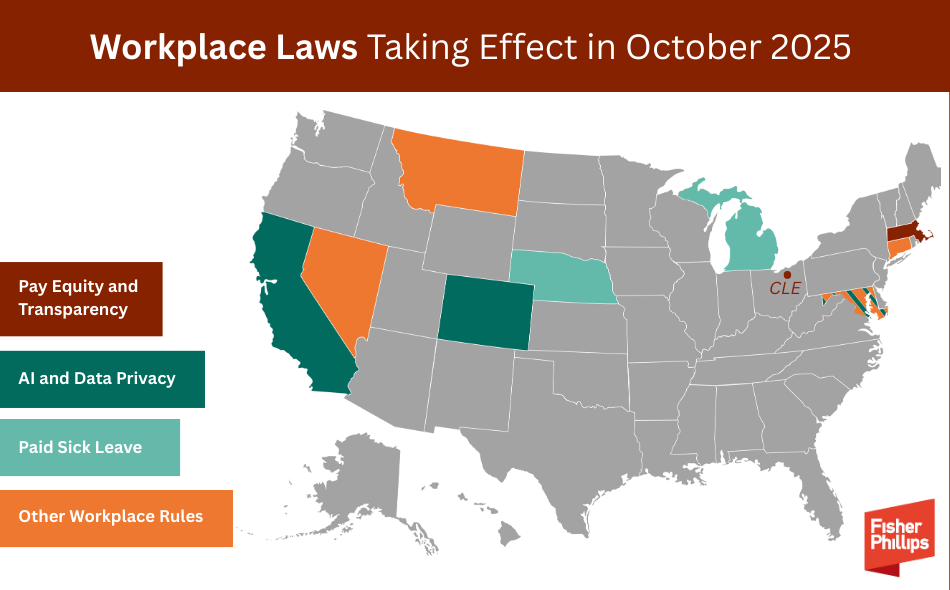October will bring vibrant foliage, cooler temperatures, and a heap of new workplace laws. From California to Connecticut, employers across the country will be impacted by state and local requirements taking effect next month. Some trends this fall include pay transparency, paid sick leave, and data privacy protections. Here’s your employer cheat sheet to the laws taking effect in October 2025.
|
Note: All laws listed here will take effect on October 1 unless otherwise noted. |
California
- Regulation of AI Use in Employment Decisions. The California Civil Council of the Civil Rights Department adopted regulations earlier this year that protect against employment discrimination as a result of the use of artificial intelligence (AI), algorithms, and other automated-decision systems. For a closer look at the new rules, check out our prior FP coverage here.
Colorado
- New Data Privacy Rules for Businesses. New privacy rules will refine protections for children’s data under the Colorado Privacy Act (CPA). Businesses that offer online services, products, or features to a consumer must comply with new requirements if the “data controller” (as defined by the CPA) actually knows or willfully disregards that the consumer is a minor. To read more about this and other CPA updates that rolled out this year, check out our prior FP coverage here.
Connecticut
- New Protections for Victims of Sexual Assault and Human Trafficking. Employers will be prohibited from discriminating against an employee or applicant based on their status as a victim of sexual assault or human trafficking. Under the new law, discriminatory practices will include, for example, denying an employee a reasonable leave of absence in order to take certain actions, such as seeking medical attention for injuries, or obtaining safety planning services, as a result of sexual assault or human trafficking.
Maryland
- New Consumer Privacy Law. The Maryland Online Data Privacy Act (MODPA) will require certain covered businesses to comply with rigid consumer privacy rules, including heightened data minimization requirements. Consumers will have a wide range of new rights – critically, however, MODPA does not require employers to extend those rights to the employment context. We previously covered everything you need to know about MODPA.
- State Parental Leave Law. Gov. Wes Moore signed a bill (SB 785) in May that will exclude an employer from the state’s unpaid parental leave requirements if it is covered by the federal Family and Medical Leave Act for the applicable year.
- Expanded Protections for Service Members. The Employment and Insurance Equality for Service Members Act will expand certain employment protections, such as leave entitlement due to deployment of an immediate family member, to all uniformed services, rather than only the armed forces.
Massachusetts
- New Pay Transparency Requirements. Beginning October 29, all employers with at least 25 employees to disclose wage range information on job postings and upon request to employees and applicants. These obligations will require employers to navigate new challenges and potential employee unrest as previously opaque wage information becomes more accessible. For our FP deep dive on these pay transparency rules (as well as the state’s wage data reporting requirements that took effect in February for most large employers), click here.
Michigan
- Paid Sick Leave Rules for Small Businesses. After a complicated history, Michigan’s new paid sick leave requirements began to roll out in February, but small businesses were given a delayed effective date. Starting October 1, however, employers with 10 or fewer paid workers must start complying with the Earned Sick Time Act (ESTA), subject to limited exceptions for certain new employers. To learn more about ESTA and its requirements for small businesses, read our prior FP coverage here.
Montana
- Job Protections for Volunteer First Responders. A new law will protect employees who elect to serve as volunteer emergency service providers (including, for example, volunteer firefighters) from termination by public or private employers under certain conditions. Employers who violate the new law could be held liable for wrongful discharge.
Nebraska
- Paid Sick Leave. Last November, Nebraska voters overwhelmingly approved a ballot measure requiring employers to offer paid sick leave benefits. The resulting new law will require employers to provide one hour of sick leave for every 30 worked, up to an annual cap of 40 hours or 56 hours, depending on the company’s total employee headcount. For more, check out our FP insight on the sharp increase in state-level sick leave requirements and how your company can manage this patchwork of state laws.
Nevada
- Stronger Protections for Working Minors. Updates to the state’s child labor standards will reduce the maximum weekly working hours from 48 to 40 for minors under age 16 and prohibit anyone under age 19 who is enrolled in high school from working between 11 p.m. and 6 a.m. before a school day, subject to limited exceptions.
- Civil Air Patrol Leave. Under AB 422, employees who are volunteer members of the Nevada Wing of the Civil Air Patrol will be entitled to a leave of absence “without loss of position, seniority, accrued leave or benefits” for up to 10 workdays per year for emergency missions training and up to 30 workdays per year for responding to emergency missions.
Ohio: Cleveland Only
- New Pay Equity and Transparency Rules. Thanks to a new city ordinance, Cleveland employers will soon need to include salary ranges in job postings and refrain from asking job applicants questions related to their salary history. Ohio’s second-largest city joins Cincinnati, Columbus, and Toledo – as well as other cities and states across the country – in adopting pay equity and transparency rules. We answered your top questions and compiled five steps you should consider taking next.
|
Note: This list should not be relied upon as a comprehensive source for any and all new laws taking effect across the country. Check with your FP attorney to determine whether the jurisdictions in which you operate have additional workplace law changes set to take effect in October or beyond. |
Conclusion
We will continue to monitor developments related to all aspects of workplace law. Make sure you are subscribed to Fisher Phillips’ Insight System to get the most up-to-date information. If you have questions, contact your Fisher Phillips attorney.





